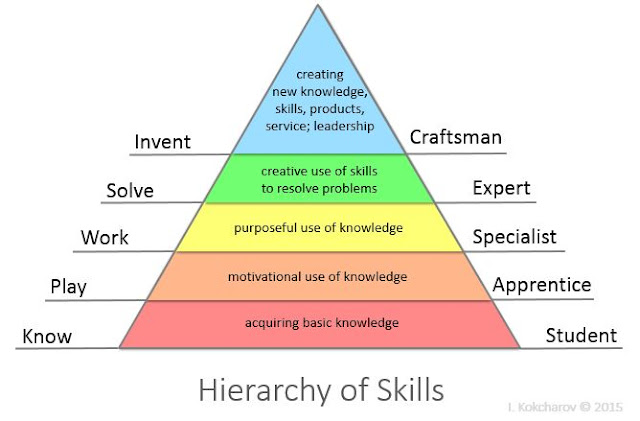Knowledge Sharing:
1. Knowledge is a familiarity, awareness or understanding of someone or something, such as facts, information, descriptions, or skills, which is acquired through experience or education by perceiving, discovering, or learning.
2. A skill is the learned ability to carry out a task with pre-determined results often within a given amount of time, energy, or both.
3. Human capital is the stock of knowledge, habits, social and personality attributes, including creativity, embodied in the ability to perform labor so as to produce economic value.
4. Human capital is a collection of resources—all the knowledge, talents, skills, abilities, experience, intelligence, training, judgment, and wisdom possessed individually and collectively by individuals in a population. These resources are the total capacity of the people that represents a form of wealth which can be directed to accomplish the goals of the nation or state or a portion thereof.
5. Skills can often be divided into domain-general and domain-specific skills.
6. To reach mastery, authors Malcolm Gladwell and Robert Greene claim that 10,000 hours of work will have to be put into training.
7. Experience is the knowledge or mastery of an event or subject gained through involvement in or exposure to it
8. The concept of experience generally refers to know-how or procedural knowledge, rather than propositional knowledge: on-the-job training rather than book-learning.
9. A habit (or wont) is a routine of behavior that is repeated regularly and tends to occur unconsciously.
10. A habit, from the standpoint of psychology, is a more or less fixed way of thinking, willing, or feeling acquired through previous repetition of a mental experience
11. The process by which new behaviours become automatic is habit formation. Old habits are hard to break and new habits are hard to form because the behavioural patterns we repeat are imprinted in our neural pathways,[6] but it is possible to form new habits through repetition.
12. Features of an automatic behavior are all or some of: efficiency, lack of awareness, unintentionality, uncontrollability.
14. Lally et al. (2010) found the average time for participants to reach the asymptote of automaticity was 66 days with a range of 18–254 days.
15. As the habit is forming, it can be analysed in three parts: the cue, the behavior, and the reward.
16. Wisdom is the ability to think and act using knowledge, experience, understanding, common sense, and insight.
17. The difference in knowledge is knowing it; wisdom is doing it.
18. Insight is the understanding of a specific cause and effect in a specific context.
19.
Key Terms:
Knowledge
Talents
Skills
Abilities
Experience
Intelligence
Training
Judgment
Wisdom
Understanding
Common Sense
Insight
References:
https://en.wikipedia.org/wiki/Skill
https://en.wikipedia.org/wiki/Ability
https://en.wikipedia.org/wiki/Experience
https://en.wikipedia.org/wiki/Habit
https://en.wikipedia.org/wiki/Wisdom
https://en.wikipedia.org/wiki/Insight

No comments:
Post a Comment